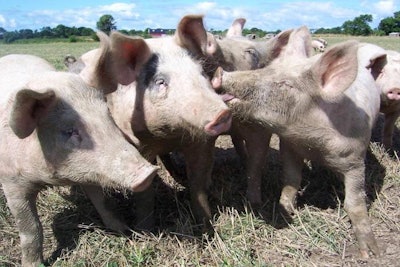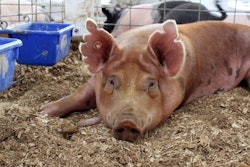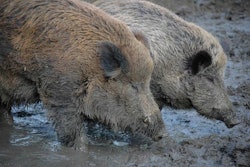
As more domestic pigs in Japan test positive for the classical swine fever (CSF) virus, pork exports to other Asian countries and further afield appear to be under threat.
Japan’s agriculture ministry is urging officials to be on alert for signs of CSF. The first outbreak of the disease since 1992 was confirmed at a farm in Gifu prefecture on September 3, 2018, and the infection has since spread to at least a further 12 farms and to four more prefectures, according to the latest official report from the ministry to the World Organisation for Animal Health (OIE).
Although the virus poses no threat to human health, officials say that the spread of CSF infections must be stemmed, reports The Japan News. Epidemic prevention measures need to be “revamped swiftly,” according to the ministry.
Vaccination is effective in stemming the spread of the CSF virus, but asymptomatic infections can persist. This could spell disaster for Japanese pork producers as exports will not resume until the country’s status as a CSF-free country is restored.
Last week, the agriculture ministry in The Philippines announced it was banning all pork imports from Japan, reports ABS-CBN. Footbaths are reported to have been installed at ports, and inspections are being stepped up of meat products brought into the country by travelers.
CSF outbreaks in farmed swine, wild boar in Japan
Between early September 2018 and February 5, 2019, there were 13 confirmed outbreaks of CSF among domestic pigs in Japan, according to official reports to the OIE. Direct losses of animals from mortality or culling already exceed 27,000.
The first outbreak was at a farm in Gifu city in Gifu prefecture, where 29 pigs — one sow, two piglets and 26 finishers — died. Cause of death was identified as CSF by the National Institute for Animal Health.
Following outbreaks in farmed pigs were sporadic, confined to Gifu, and tended to be in small herds that were located within 10 kilometers of previously confirmed cases.
However, by late January, sick pigs were testing positive for the CSF virus at larger farms and located in other prefectures — Aichi, Nagano, Osaka and Shiga. The five most recent outbreaks reported to the OIE were linked through the movement of pigs to an outbreak in Toyota in Aichi prefecture.
Since its latest report to the OIE, Japan's agriculture ministry has announced a further CSF outbreak in Tahara city, affecting 130 breeding pigs and 1,050 finishers. This is the third outbreak in Aichi prefecture.
The local governor has urged officials to take all possible measures to deal with the emergency, reports NHK World. Those measures include movement bans on all farms where suspicious symptoms or deaths occur in pigs, culling the whole herd if CSF is confirmed, and banning movements of pigs to or from farms within a 10-kilometer radius of infected premises.
Source of the original infection is unknown, but the virus has subsequently been detected in wild boar found dead in Gifu prefecture and neighboring Aichi although not so far in other areas of Japan.
Also known as hog cholera, CSF is a severe, contagious, systemic viral disease that is endemic in the majority of the world’s pig populations. Last year, CSF was reported in a non-commercial pig herd in northeastern Brazil.
Symptoms of CSF in pigs are similar to those of African swine fever (ASF), which is affecting the population of wild boar as well as domestic pigs in central and eastern Europe, and China.

















